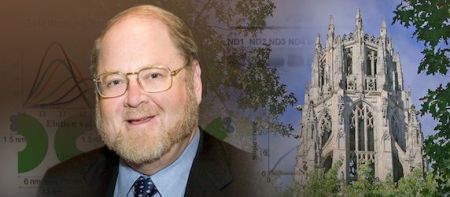James E. Rothman, Nobel Prize Winner in Physiology or Medicine 2013, spent the most extraordinary week of his life in Sweden when accepting ‘the once in a lifetime recognition’ with his colleagues Randy W. Schekman and Thomas C. Südhof at the Nobel Awards ceremony in Stockholm.
During his trip Rothman, also senior advisor to GE Global Research in Niskayuna, NY, paid a visit to GE Healthcare Life Sciences site in Uppsala.
Speaking to an audience of fellow scientists and researchers, Rothman began by explaining the discovery that he and his colleagues were recognised for.
The three scientists were awarded the Nobel Prize for their discoveries of the machinery regulating cellular vesicle transport and trafficking, a fundamental function for our cells.
Their work specifically focuses on how cells address the matter of effective exchange, import and export of specific molecules, such as proteins, between different compartments and the cell surface.
It is of special interest as GE Healthcare Life Sciences support researchers and industry with tools used for the study and characterisation of cells and biomolecules.
“What my colleagues and I have been recognised for is the bioprocessing within the cell,” he said. “The body is made up of cells that make up your muscle, liver or the nerve cells in your brain. These cells need to communicate with each other, otherwise they get out of synch and the liver won’t function like a liver.”
“There have to be signals or information flowing between the components of the system in order for it to function in a coherent way. The work we have done has explained how those signals are produced and passed between cells. The process is called membrane fusion or secretion. It’s the same process for when the body needs to secrete antibodies.”
When sharing his views on the future of life sciences Rothman pointed towards precision medicine as an area that could gain significant advances in the next decade or so.
GE Healthcare Life Sciences existing work in oncology and its Clarient business are seen as a company commitment to expand its advanced cancer diagnostic and molecular imaging capabilities.
“What’s exciting for me is the field of diagnostic medicine and whether it’s applying a drug more effectively to the right person or diagnosing someone more precisely through imaging. Or is it using ultrasound along with another modality to deliver the drug in the right place at the right time? The biggest opportunity I see is to take what we have and learn how to use it better.”
“We’re finding that cancer and neurodegenerative diseases are emerging as conditions that need greater attention. These are difficult diseases, very complex,” he said.
Rothman also extended this theme to a treatment’s cost citing the U.S as a country was already getting to grips with appreciating the cost benefit. He said that companies that embraced this concept would benefit greatly in the long run.
When talking about transformational technology that scientists could expect to emerge in the near future, Rothman pointed towards soft X-ray microscopy as a real possibility within the next decade. He believed that with this method it would be possible to see individual membranes, ribosomes, and nuclear pores. He thought that combining this method with super resolution fluorescence would be revolutionary.
“What would really revolutionise my field of cell and developmental biology though would be the ability to visualise ultrastructure and individual molecules in real-time at the same time in living tissue. That’s every geneticists, morphologists and biochemist’s dream,” he concluded.
Rothman is currently the Fergus F. Wallace Professor of Biomedical Sciences at Yale University, the Chairman of the Department of Cell Biology at Yale School of Medicine, and the Director of the Nanobiology Institute at the Yale West Campus. Over the last decade he has served as a senior advisor to GE Global Research in Niskayuna, NY. He is also a former chief scientist at GE Healthcare.
Source: GEHealthcare
Image Credit: Google
19 December 2013
Latest Articles
Research, Medicine, medical research, GE Healthcare, Nobel Prize, precision medicine
James E. Rothman, Nobel Prize Winner in Physiology or Medicine 2013, spent the most extraordinary week of his life in Sweden when accepting ‘the once in...



























